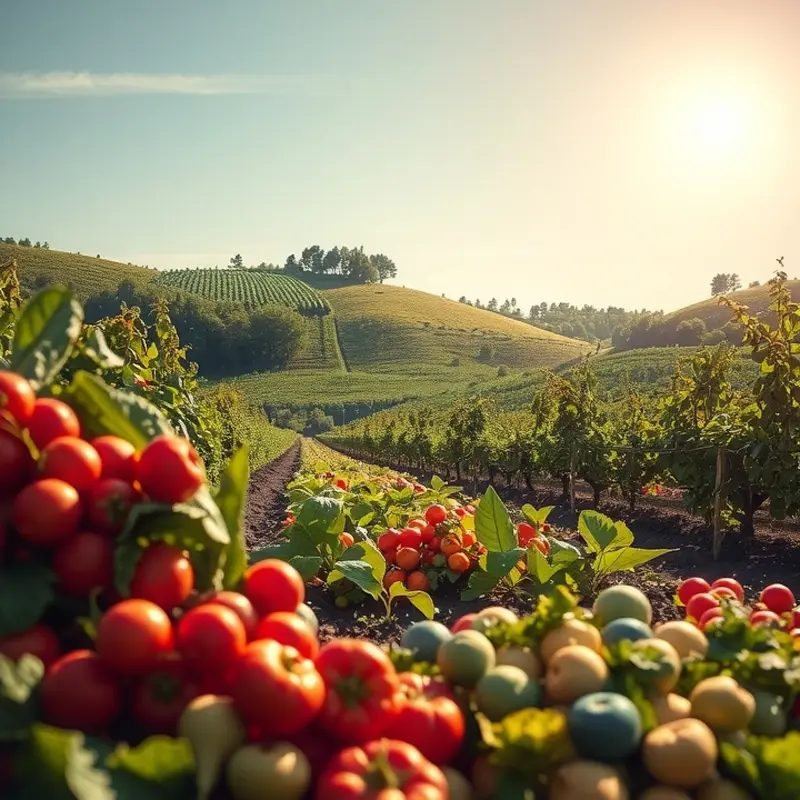Frozen vegetables are often seen as convenient and economical, but there’s a lingering question: do they lose their nutritional value? Understanding the journey from field to freezer and how nutrients are preserved can help you make informed dietary decisions. Let’s dive into the facts to set the record straight on frozen produce.
From Harvest to Freezer: Nutrient Preservation

From the moment vegetables are harvested, they embark on a journey that profoundly influences their nutritional properties. The clock starts ticking the moment these are plucked from the soil, since they are no longer receiving nutrients and begin to lose moisture and nutrients. However, the transition from fresh harvest to frozen products, when done efficiently, can actually lock in essential nutrients.
Once vegetables are harvested, they generally undergo a process known as “blanching” before freezing. This involves briefly boiling them followed by rapid cooling in ice water. The primary purpose of blanching is to halt enzyme actions that continue to degrade quality after harvesting. It also helps to cleanse the surface of dirt and organisms, brighten the color, and prevent loss of flavor and texture during storage.
This short heat treatment may seem like it could lead to nutrient loss. However, the nutrients that are most susceptible to heat—such as vitamin C and some B vitamins—are preserved more effectively when the food is quickly cooled and frozen. Moreover, the freezing process halts further significant nutrient loss, locking in the vegetables’ macronutrient profile.
Speed is crucial in minimizing nutrient loss. From the field to processing facilities, timing affects how much nutrition the vegetables retain. Swift transportation to a nearby freezing facility ensures maximum nutrient retention, as prolonged exposure to light, heat, or air can degrade their nutritional profile. Fastidious attention to these handling details contributes significantly to the preservation of key nutrients like fiber, carbohydrates, and certain minerals.
It is intriguing to note that, in some cases, vegetables frozen soon after harvest may retain nutrients better than those purchased fresh, particularly when fresh produce has endured long transport times and storage before reaching the consumer. In many cases, “fresh” vegetables at the store lose more nutrients due to age or improper storage than properly frozen produce.
In the context of today’s eating habits, as people seek sustainable kitchen practices, utilizing frozen vegetables can also align with reducing waste and managing portion control. By integrating frozen vegetables into meal prep, like those minimal prep dinner ideas, people can enjoy convenience while ensuring their meals are rich in nutrients.
While the word “frozen” might evoke images of loss or compromise, in reality, the modern freezing process effectively preserves nutrition. Consumers can feel confident integrating frozen produce into their dietary habits, assured that their meals remain nutritious and beneficial.
Nutritional Comparisons: Fresh vs. Frozen

When it comes to assessing the nutritional value of fresh and frozen vegetables, several factors come into play. Both options provide essential nutrients, but various processes impact their nutrient content. Understanding these differences can help you make informed choices at the grocery store.
Fresh vegetables are often harvested before they are fully ripe. They continue to ripen during transportation and storage, which can sometimes lead to nutrient degradation. This means that, while fresh vegetables do have high nutritional potential, time spent off the plant can gradually reduce their available nutrients. For example, studies have shown that vitamins like C and folate are particularly susceptible to degradation over time.
In contrast, frozen vegetables are usually picked at peak ripeness. This means they have had more time to develop nutrients fully. After harvesting, they are flash-frozen shortly to lock in their nutrient content. Research indicates that freezing can preserve many nutrients effectively. For instance, the levels of vitamin A, carotenoids, and fiber are often well retained in frozen peas and spinach.
It’s important to note that not all nutrients react to freezing in the same way. Some water-soluble nutrients, like vitamin C, can be susceptible to loss during the blanching process, meant to maintain color and texture before freezing. However, this initial nutrient loss is generally less significant compared to the potential degradation seen in fresh produce as it ages.
When comparing fresh and frozen vegetables in terms of antioxidants, studies often find them to be comparable, with some frozen varieties even having higher antioxidant levels. This can be attributed to factors such as the reduced exposure to oxygen once they are frozen.
Considering eco-smart kitchen storage practices can also enhance the nutritional value of vegetables. For example, proper home storage of fresh vegetables in cool, dark places can slow nutrient loss. Learn more about eco-smart kitchen storage.
Ultimately, fresh and frozen vegetables each hold their own nutritional benefits. Fresh vegetables provide the opportunity to consume the highest potential nutrient content at the time of harvest. Meanwhile, frozen vegetables offer a convenient and often equally nutritious alternative, especially when fresh options are out of season or if they are not stored optimally at home.
Choosing between fresh and frozen doesn’t have to be a strict either/or decision. Including a mix of both in your diet will ensure you benefit from the rich array of nutrients vegetables have to offer. Pairing them with other nutrient-dense foods can further enhance your dietary intake. The key is to focus on incorporating a variety of vegetables, regardless of their form, to sustain a balanced and healthful diet.
Final words
In summary, frozen vegetables can be just as nutritious as their fresh counterparts when properly handled. Flash-freezing shortly after harvest helps preserve essential vitamins and minerals. While some water-soluble vitamins might decrease slightly during freezing and cooking, the overall benefit of incorporating frozen vegetables into your diet far outweighs potential losses. By making informed choices about your produce selections, you can enjoy the convenience of frozen veggies without sacrificing your nutrition. Embrace both fresh and frozen options for a balanced and healthy diet.








